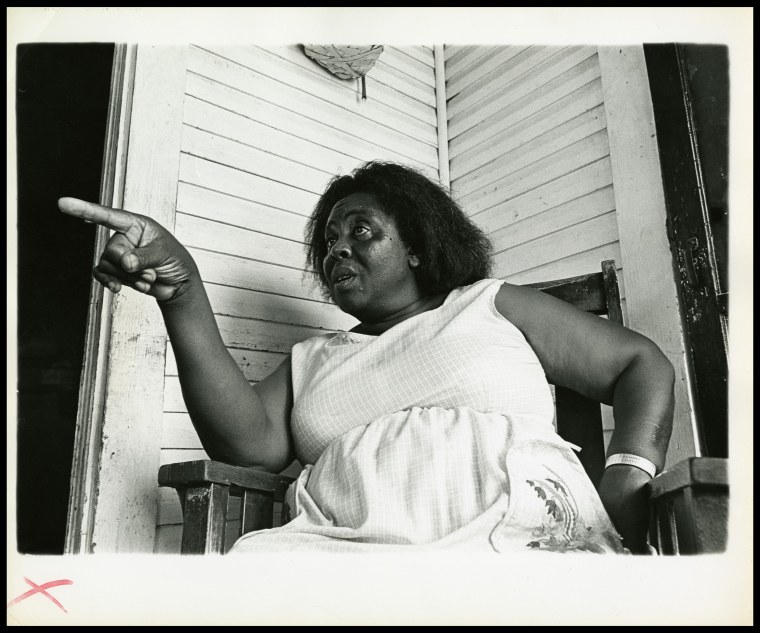We hear a lot these days about the consequences of the Voting Rights Act being under attack. With its 2013 ruling in Shelby County vs. Holder, the Supreme Court undermined the use of preclearance by federal courts and the Justice Department. The Brennan Center for Justice reports that 19 states passed 34 laws that restricted voting access in 2021 and is now tracking 250 bills that seek to restrict voting access in 27 states. But we don’t hear enough about how the 1965 legislation came to be or the effects it had in the United States. In Mississippi, for example, the number of African Americans registered to vote suddenly increased from 28,000 to about 280,000 following the passage of the Voting Rights Act in 1965.
It’s hard to imagine there being a Voting Rights Act without Fannie Lou Hamer, a working-poor, disabled Black woman.
It’s hard to imagine there even being a Voting Rights Act without Fannie Lou Hamer, a working-poor, disabled Black woman who joined the civil rights movement at 44. With her unsurpassed bravery and skillful use of public testimony, Hamer captured the attention of millions of Americans and helped push President Lyndon B. Johnson into action. In recognition of Women’s History Month and in response to the ongoing assault on voting rights, it’s important to remember Hamer on the anniversary of her death on March 14, 45 years ago in the Mississippi Delta.
Hamer, whose grandparents were enslaved, worked as a sharecropper until 1962 when her life changed dramatically. She attended a mass meeting organized by activists in the Student Nonviolent Coordinating Committee (SNCC), an interracial civil rights organization, at a church in Sunflower County, Mississippi. SNCC’s message about the power of the vote resonated with Hamer. “We could vote out people that we didn’t want in office,” she later recalled. “That sounded interesting enough to me that I wanted to try it.”
Hamer had limited formal education, but she didn’t need much to know that access to the ballot would bring the power to shape local, state and national politics. Deeply moved by the words of the young SNCC activists, she later became a field secretary for the committee and helped Black Mississippians register to vote when registering could lead to physical intimidation or worse.
In 1963, Hamer was taken into custody because of her political activity and held in jail in Winona, Mississippi, where she was assaulted by police officers and prisoners who were directed by those officers to beat her. It was a traumatic event that she recounted to the nation the next year during the Democratic National Convention in Atlantic City, New Jersey.
Hamer, who was in Atlantic City demanding that the Mississippi Freedom Democratic Party she’d help establish (and not the all-white Mississippi Democratic Party) be recognized as the state’s official delegation, gave an electrifying speech to the party’s credential committee that was seen by millions of television viewers.
She spoke of the roadblocks she encountered when she tried to register to vote in 1962 at the Indianola, Mississippi, courthouse and of being evicted by the owner of the plantation where she worked as a sharecropper when she refused to withdraw her registration. She spoke of the persistent acts of racist violence Black men and women faced daily in the Jim Crow South and in Mississippi, where an estimated 5 percent of the state’s 450,000 Black residents were registered to vote during the early 1960s.
"Is this America, the land of the free and the home of the brave, where we have to sleep with our telephones off of the hooks because our lives be threatened daily?"
After sharing the details of officers and prisoners beating her, she asked, with tears welling up in her eyes, “Is this America, the land of the free and the home of the brave, where we have to sleep with our telephones off of the hooks because our lives be threatened daily, because we want to live as decent human beings, in America?”
Her 1964 speech laid bare American hypocrisy, stunned a national audience and helped to propel the movement for Black voting rights. On Aug. 6, 1965, Johnson signed the Voting Rights Act, which dramatically bolstered Black political participation in the South.
A major victory in the fight for Black voting rights, the Voting Rights Act has been under attack ever since and, especially since the Shelby ruling, a number of state and local laws have been passed to curtail the Black vote. These developments are a bitter reminder that the fight for voting rights is far from over. Now, more than ever, we must look to courageous Black leaders such as Fannie Lou Hamer who passionately fought for Black voting rights but believed that all Americans, regardless of race, gender, sexuality, religion or ability, should have full and equal access to the ballot.
Throughout the 1960s, Hamer reiterated this point to anyone who would listen. During a 1969 appearance before the Democratic Reform Committee, she said, “I believe in a principle that until this nation wake up and see that it’s something wrong and without some straightening out being done, we are on our way out. It have to be with the people, for the people, and by the people.”
Indeed, the concept of American democracy means nothing without equal protection and equal access for all.

